
Wednesday June 17, 2020
Photo story by United Nations Assistance Mission in Somalia
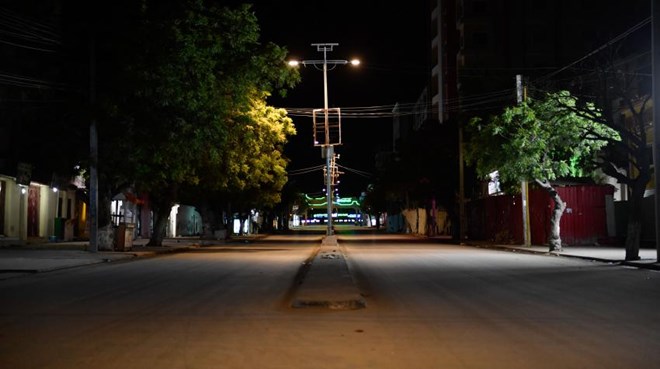
Roads near Mogadishu’s well-known Bakara Market lie deserted due to a 5pm to 8am curfew imposed 15 April. United Nations photo: UNSOM
Since it first emerged at the start of 2020 as a global health crisis, COVID-19 has spread to nearly every country in the world. Defined as the greatest challenge the world has faced in decades, the pandemic has disrupted entire nations’ social, economic and political lives. Somalia joined the long list of countries dealing with COVID-19 on 16 March 2020, when federal Health Minister Fawziya Abikar announced the first confirmed case. A series of urgent measures have been taken to protect the population.
This photo essay provides a snapshot of some of the pandemic’s impact and the steps taken by the Somali people and government to combat it.
An airport with no passengers
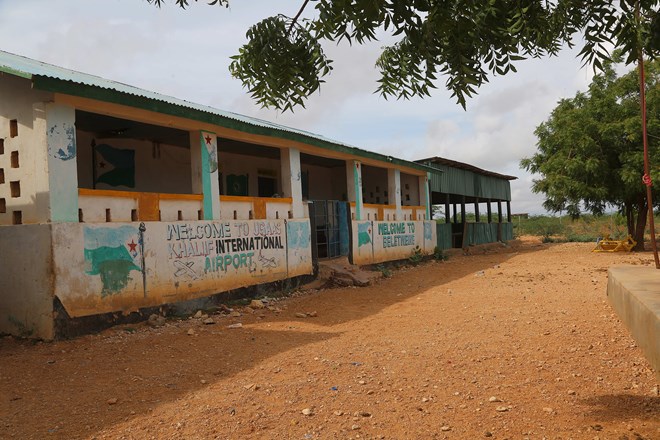
At the Ugaas Khalif Airport in Belet Weyne, in Somalia’s Hirshabelle, the sound of aircraft taking off and landing, along with the hustle and bustle of passengers coming and going, are long gone. Like at all of the country’s other airports, most international and domestic flights have been suspended – a measure enforced by the Somali Civil Aviation Authority to curb the spread of COVID-19.
Someone to call
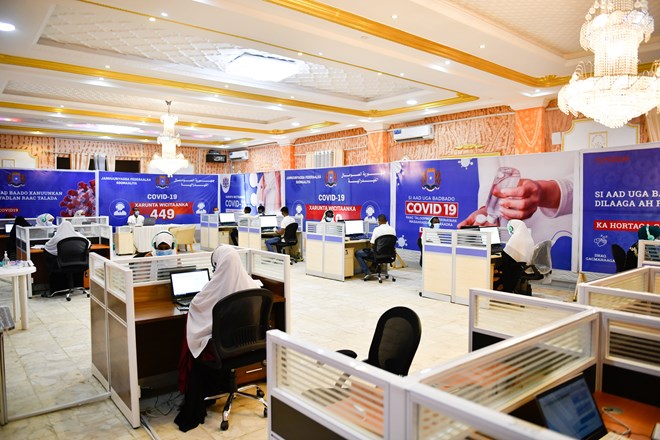
As part of strategic initiatives to halt the spread of COVID-19, the Federal Government of Somalia set up a toll-free call centre with the support of the United Nations and others. At the call centre, medical professionals provide free consultations over the telephone to members of the public. More than 3,000 calls are made to the toll-free number of 449 each day from across Somalia.
Information can save lives
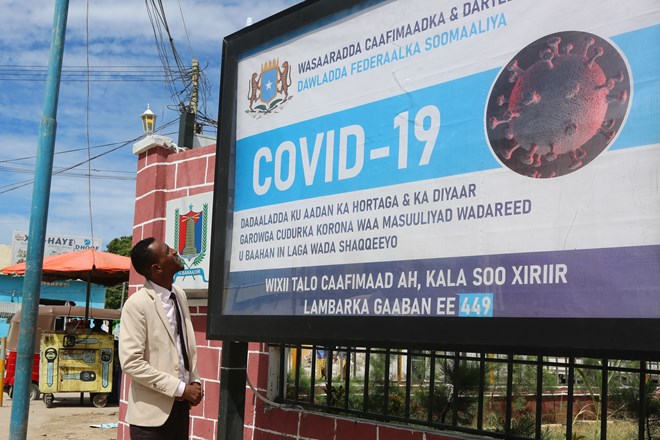
The Somali authorities have ramped up a national public information campaign on COVID-19, using both traditional and new ways of reaching the public. This includes using radio, billboards and outdoor posters to alert and inform citizens about coronavirus symptoms and preventive measures and guidelines, as well as social media platforms. Shown here, a man reads COVID-19 awareness messages on a billboard at the KM 4 junction in Mogadishu.
Hygiene in your hands
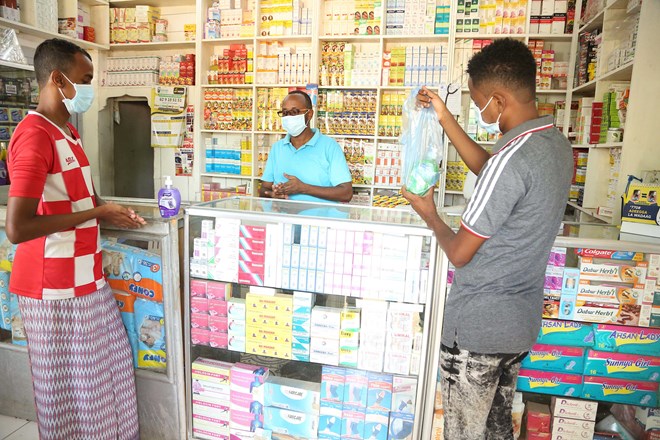
Good hand-washing practices to help stop the spread of COVID-19. Shown here, customers purchase hand sanitizers at a pharmacy in Jowhar, in Somalia’s Hirshabelle state. The pharmacy now sells an average of 60 hand sanitizers a day – a significant increase to previous sales of the same product before the COVID-19 pandemic reached Somalia.
Staying informed, protecting family
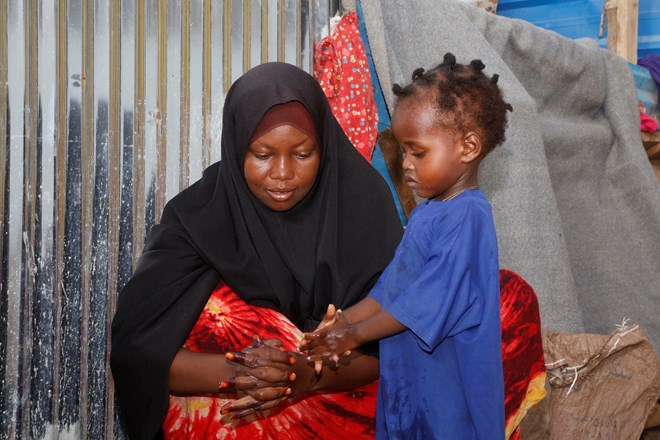
Responding to COVID-19 is an individual and group effort. Shown here, Abshiro Shamsi Salah of Koshin village in Belet Weyne, Hirshabelle state of Somalia, teaches her young daughter to wash her hands. "I constantly teach my daughter how to wash hands in the recommended way. I do this to protect my family. When the first case of COVID-19 was reported in Somalia, we did not leave our house for a month because we were afraid. To keep myself updated about the virus, I listen to the radio and follow the advice of health officials," says Abshiro.
Vulnerable groups at risk
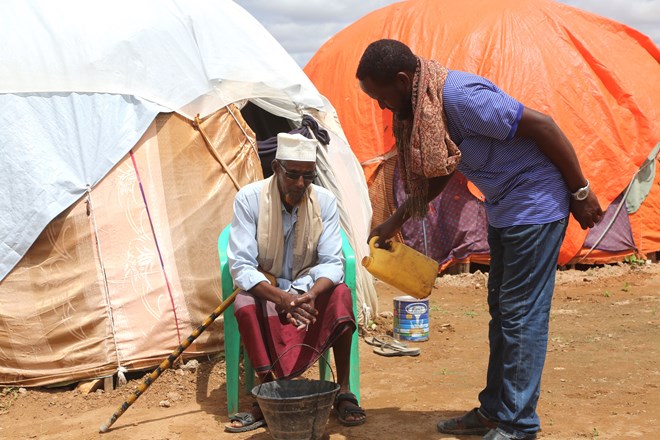
The pandemic has a disproportionate impact on vulnerable groups such as persons with disabilities, internally displaced people (IDPs), the elderly, and the poor. For some, the simple preventive measures against COVID-19 can be a challenging task in and of themselves. Shown here, Mohamed Sheikh Hassan, who lives in Haliye camp for IDPs in Belet Weyne, Hirshabelle state of Somalia, washes his hands. “In this camp, we have limited access to water and sanitation services, but I have been carefully following the advice of health officials. Through the radio, I have learnt that regular washing of hands with soap can help to protect my family and myself against the virus,” says Mohamed.
Stopping the spread
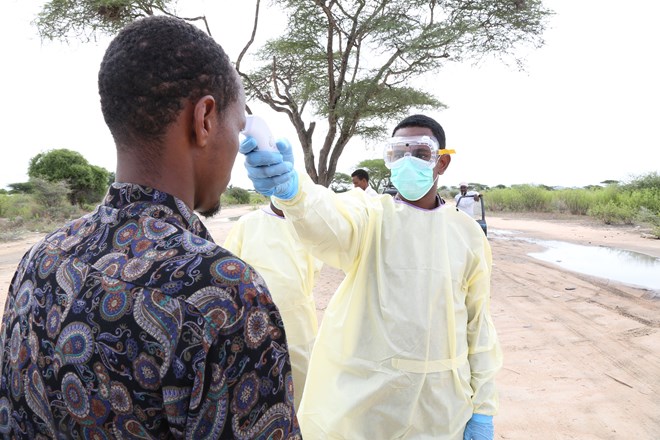
Somalia’s federal and regional authorities, in conjunction with various organizations, have undertaken a wide range of measures to combat COVID-19’s spread. These measures include putting in place water points across Dhobley town, in Somalia’s Jubaland state, for visitors and locals to wash their hands with soap as well as – shown here – screening travelers along the busy transit route connecting Somalia to Kenya in order to detect any carriers of the virus.
New way of working
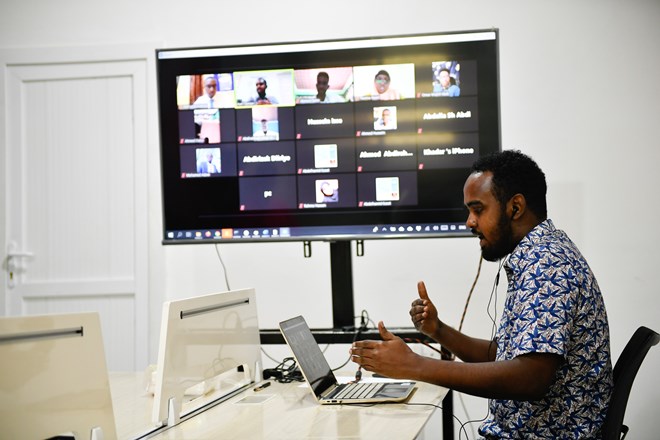
The impact of COVID-19 in Somalia is wide-ranging, including on the way people work in some industries. To contain the virus’ spread, some organizations and companies have adopted various workplace social distancing measures or issued work-from-home directives to their employees. Shown here, Awil Osman of Mogadishu's technology and innovation hub iRISE, attends a virtual meeting with his co-workers.
New way of governing
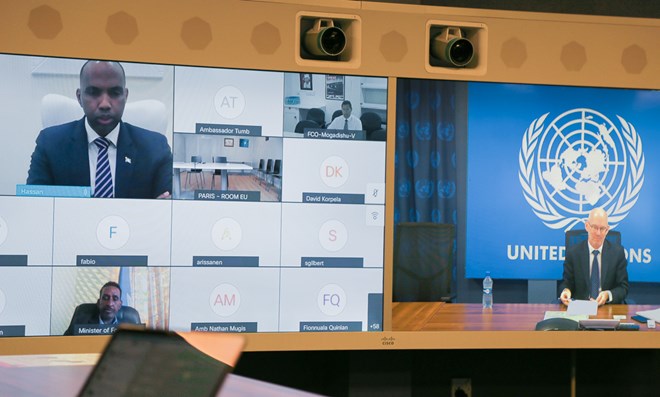
Setting COVID-related policies means also being at the forefront of putting them in practice. Since the outbreak of the pandemic, Somali authorities have also embraced new ways of working, collaborating, and keeping in touch with partners. Shown here, Prime Minister Hassan Ali Khayre, UN Special Representative for Somalia James Swan and other key Somali and international actors meet in a virtual setting.
New way of buying and selling
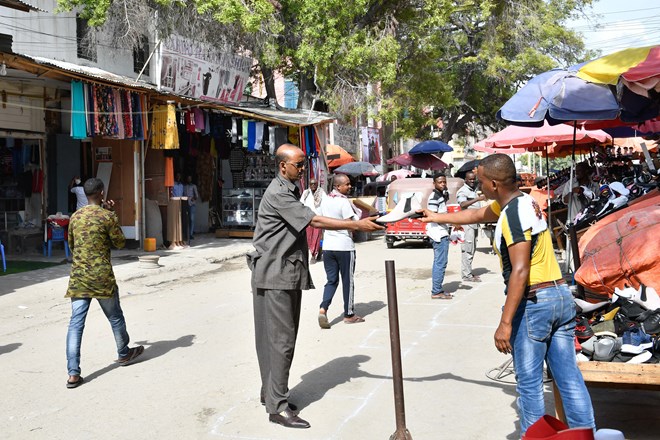
The new ways of working are not limited to those working with keyboards, screens and touchpads. Traders throughout Somalia have found ways to continue running their businesses while adopting the new rules of social distancing. As shown here, a transaction in Mogadishu’s Hamarweyne district takes place with both sides observing the white chalk marks traced on the ground to help ensure safe physical distancing.
No school today
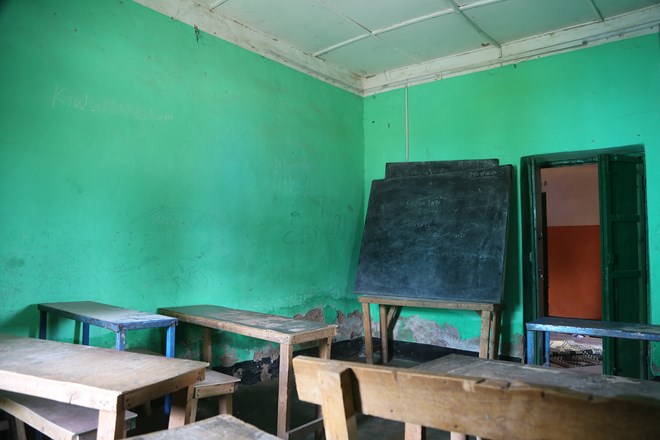
A day after the first COVID-19 case was confirmed, Somali authorities announced that all of the country’s educational institutions would be closed for 15 days, in a bid to stop the spread of the disease. The order was subsequently extended. It is estimated that the closure of schools has left more than one million children with no access to education.
Online options
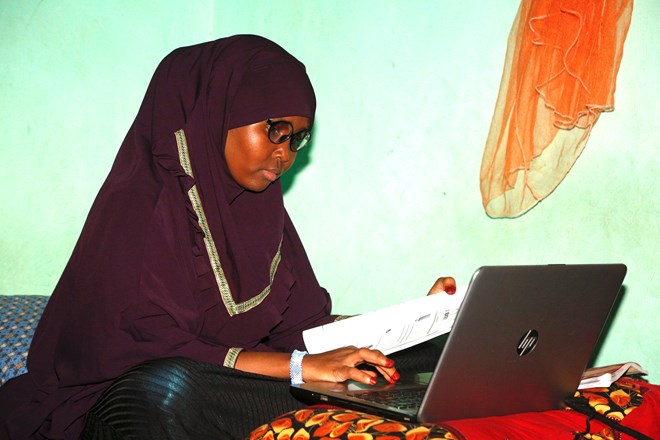
Some higher education institutions are finding ways to keep teaching their students. Several have migrated to online classes to enable learning to continue while COVID-19 preventive measures are still in place. Shown here, Hawo Aden Hussein, a Jobkey University student, attends an online class from her home in Belet Weyne, in Somalia’s Hirshabelle state. "At the beginning, online learning was difficult for me and my classmates because it was something new. We struggled with it. I missed interacting with others and doing schoolwork together. At home, I don't have a room in which I can sit and study. I share my room with others, and I also have to do house chores in between my studies," says Hawo.
Staying safe together
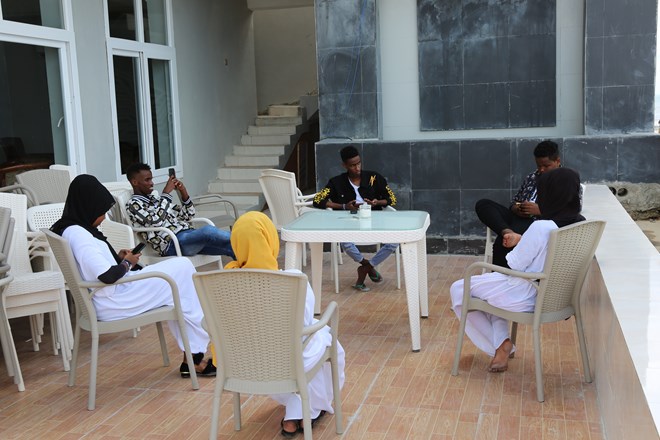
COVID-19 has changed not only the way people work and learn, but also the way they socialize and interact. Shown here, a group of young people enjoy some downtime at a restaurant in Mogadishu while observing the social distancing recommendations by staying at least 1.5 metres away from each other.
An empty beach
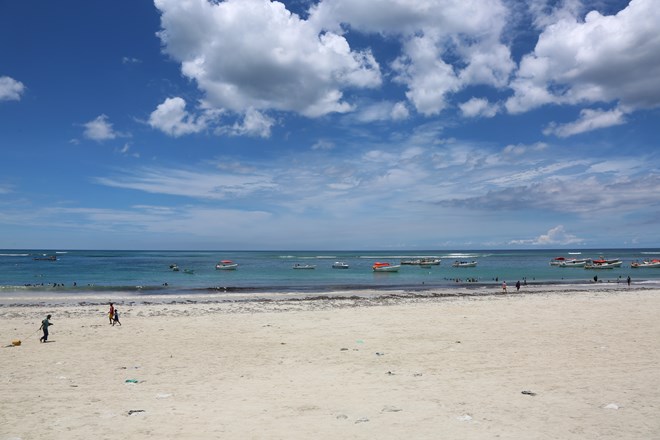
Mogadishu’s Lido Beach is normally a hub of activity, with people enjoying the breeze, the view and the cool waters. As seen here, nowadays, only a few people enjoy Somalia’s beautiful beaches in light of the stay-at-home and social distancing measures against the spread of COVID-19.
Open, but no business
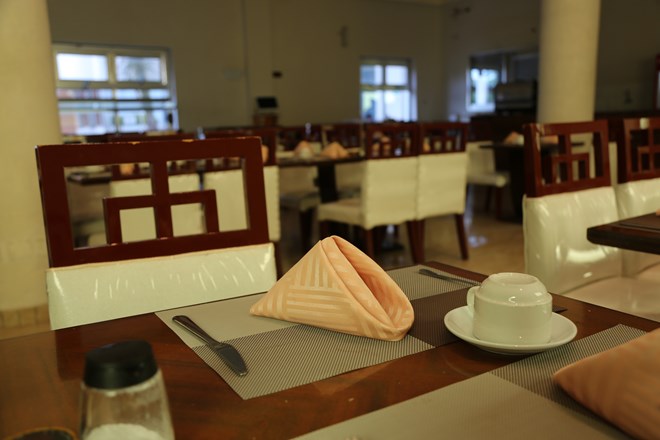
While some businesses have found ways to keep going during the COVID-19 response, others are having a harder time. Authorities have urged people to stay home to halt the spread of COVID-19 and this has had a knock-on effect on Somalia’s hospitality sector. Shown here, a popular restaurant in Mogadishu, usually brimming with happy customers, is now quiet and empty.
Rooms available
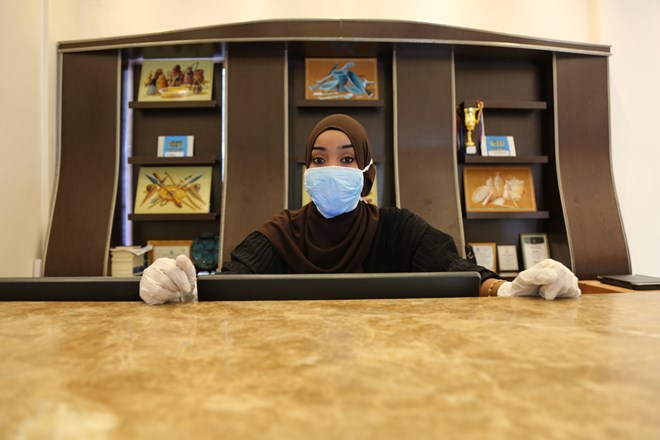
Along with restaurants and eateries, the Somali hotel sector is also greatly impacted by the COVID-19 pandemic, with less travel meaning less need for rooms. Shown here, a woman wearing a safety mask and gloves attends the reception counter of a hotel in Mogadishu.